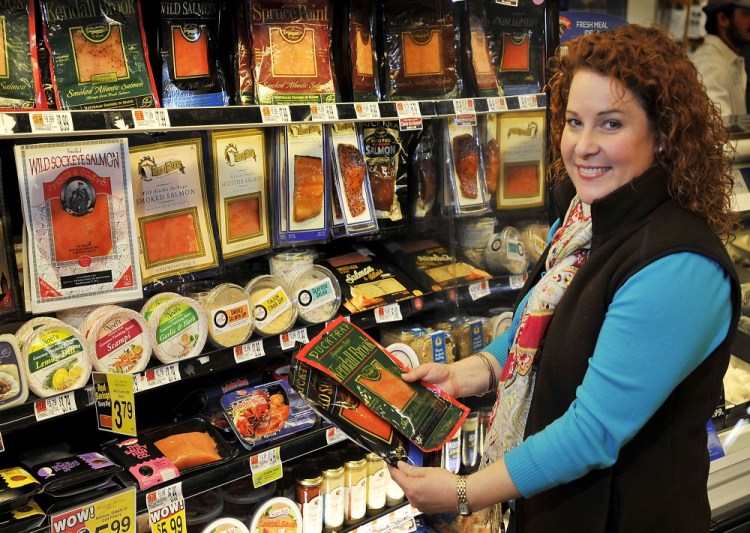America’s supermarkets use a lot of energy bringing consumers their frozen food and keeping them comfortable while they shop. They also consume a lot of water and generate a lot of trash.
Grocery stores produce more than 68 million tons of carbon dioxide each year, nearly the same as the emissions from 13 million cars, according to the Manomet Center for Conservation Sciences in Plymouth, Massachusetts. Peter Cooke, Brunswick-based manager of Manomet’s Sustainable Economies program, doesn’t see this as a problem but as low-hanging fruit – “a huge opportunity.”
“I don’t think there’s another business sector out there that has quite the opportunity the grocery sector has for communicating and demonstrating sustainable practices,” he said.
Hannaford, based in Scarborough, is “definitely a leader in the country for managing sustainability across a really large number of stores,” Cooke said.
Hannaford, which – full disclosure – was a major advertiser in Source in its first year, is the winner of our Pollinator Award. Our judges unanimously and quickly selected the grocery chain among a strong group of nominations. They liked the fact that Hannaford’s sustainability efforts set an example with the potential to encourage other large grocery store businesses to institute their own environmentally minded practices. The judges singled out Hannaford’s work on seafood for praise; the chain traces every seafood product in every department back to its source in order to document that all seafood in its stores is harvested sustainably.
Hannaford tackles sustainability issues in a systemic way, covering everything from energy costs to food waste and reusable bags – most recently sponsoring a two-week education campaign to give away reusable bags in advance of a new 5-cent fee imposed on disposable paper and plastic bags by the city of Portland.
Notable steps taken by the chain include opening the first LEED Platinum supermarket in the United States, in 2009 in Augusta. (LEED Platinum certification is the highest rating possible from the U.S. Green Building Council.) And in 2013, Hannaford installed the country’s first cooling and freezing system that uses only carbon dioxide as a refrigerant, in its Turner store. Hannaford won the EPA’s Best of the Best Award for the Turner project, which cut back significantly on greenhouse gas emissions.
Hannaford also has several projects to reduce food waste, including setting up in-school food pantries and buying trucks and refrigeration equipment for food banks. Last year, the chain donated 14.6 million pounds of food to hunger-relief partners across the Northeast.
Phil Lempert, a national analyst known as “The Supermarket Guru,” follows food trends and consumer behavior. He said many grocery stores are starting to clean up their environmental footprints because such efforts have attracted the attention of consumers.
“People want to know more about the companies that they’re doing business with, including supermarkets,” Lempert said. “It’s becoming more and more important all the time. People want to know that their retailers are being responsible, that we’re all on this planet Earth together. And as we look at climate conditions, and the drought in California, and all these other things, people are getting smarter about it, and they just want to reward those companies that are serious and making an effort.”
Kasey Harris, a member of Hannaford’s sustainability team, said the store’s practices save the company money, which in turn helps customers save money.
“We are finding in our research that sustainability is important to our customers,” she said. “It’s important to the people that we employ as well. So we do it for a number of reasons.”
According to a recent study done by the Manomet Center, Hannaford’s sustainability efforts have saved the business $15 million a year and kept more than 430 million pounds of greenhouse gases from being emitted, the equivalent of taking more than 41,000 cars off the road. Hannaford’s goal is to cut its carbon footprint by 20 percent by 2020.
Cooke said most grocery chains now have sustainability managers on board. He’s been working with a half-dozen chains from Maine to Texas, including Hannaford, helping them work on a systemic approach to sustainability.
Last year, Cooke examined all 184 Hannaford stores for Manomet’s Grocery Stewardship Certification program and granted immediate certification to 179 of them. The remaining five stores received provisional certification. Hannaford has stores in Maine, Massachusetts, New Hampshire, New York and Vermont. (We admit we also like the supermarket chain because it’s homegrown; it got its start as a horse-drawn produce car on Portland’s waterfront.)
Harris said the interest in sustainability is “a bit contagious” among the company’s leaders, “and then you start to feel it as an associate. Once you’ve been part of one project, you feel empowered to look at another initiative or current issue.”
Send questions/comments to the editors.



